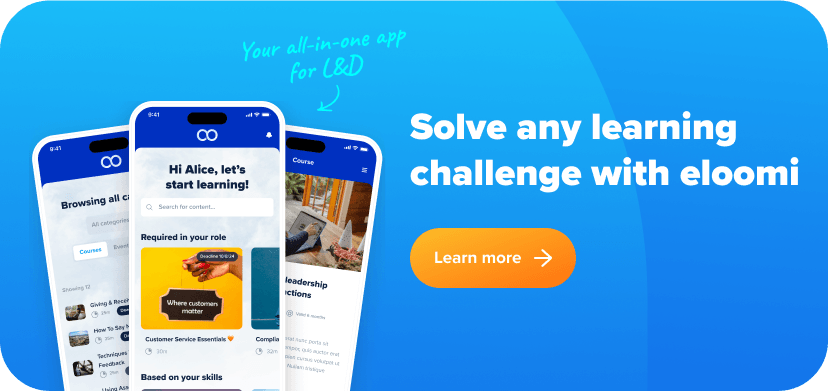Join us as we take a detailed look at what LMS CRM integrations are, the benefits they bring and the features to prioritize, along with practical tips that ensure a successful implementation.
Understanding LMS CRM integrations
Integrating LMS and CRM platforms can seem complex, but the value it brings makes it well worth the effort. So, just what are LMS CRM integrations? And how do they work?
What are LMS CRM integrations?
LMS CRM integrations involve connecting two distinct platforms that serve critical organizational needs. An LMS is a system designed to manage, deliver, and track training programs, while a CRM focuses on organizing customer interactions, managing data, and supporting sales activities. Together, these systems work in harmony, providing a unified platform for streamlined operations and enhanced user experiences.
The role of APIs in LMS CRM integrations
At the heart of these integrations are Application Programming Interfaces (APIs). They enable the seamless flow of data such as user profiles, training progress, and customer behaviors between systems, ensuring both platforms remain synchronized and updated in real time.
For example, your sales teams can track their training progress directly within the LMS, while the CRM updates the system with relevant data, depending on your goals and KPIs. By automating data exchanges, APIs reduce manual work, minimize errors, and ensure that training aligns with business objectives.
This alignment enables you to streamline processes such as customer onboarding, employee training, and sales enablement, creating a more cohesive and effective approach to learning and development. The result is an integrated system that supports your organizational goals, while enhancing the learning journey for users.
Streamline the way you work with eloomi
Integrating an LMS with other tools and platforms doesn’t need to be complicated. eloomi makes this process seamless, offering integration with over 40 HR systems, including Sage HR, Workday, ADP, and SAP SuccessFactors, along with tools like Microsoft Teams and LinkedIn Learning. As a Dayforce company, eloomi is also available as part of the Dayforce HCM platform, and as a standalone LMS with Dayforce integration to make HR task management simple at every step.
These integrations create a cohesive ecosystem that simplifies workflows and enhances user experiences, making training and collaboration more efficient than ever.
What’s the benefit of CRM integration with LMS?
LMS CRM integrations are about more than just connecting two systems. They create an interconnected structure that delivers real business value, improving processes, data management, and learner engagement – ultimately saving you time and resources.
1. Streamlined user data management
An LMS CRM integration simplifies the management of user data by automatically synchronizing profiles between the two systems, eliminating the need for manual updates. This ensures both platforms remain consistent and up-to-date while enabling you to efficiently manage changes such as new hires, role transitions, or departmental shifts. For instance, when a role is updated in the CRM, the LMS can automatically assign training aligned with their new responsibilities.
2. Enhanced onboarding and sales training
Automating processes like customer onboarding becomes effortless with LMS CRM integrations. Customers added to the CRM can be immediately enrolled in educational programs that help them get the most out of the product or service. For sales teams, integrating training progress tracking within the CRM ensures continuous professional development tailored to their specific needs. This seamless connection between learning and workflow ensures that training efforts align with business objectives, improving overall efficiency.
3. Unified analytics and reporting
Combining data from the LMS and CRM provides organizations with a complete view of performance across learning and customer engagement. Metrics such as training completion rates, customer satisfaction scores, and revenue growth can be analyzed collectively, delivering actionable insights that inform strategic decisions. Unified reporting helps organizations identify trends, optimize training programs, and improve customer experiences. All based on real-world data.
4. Boosting learner engagement and retention
Personalization is key to engagement. And LMS CRM integrations make it possible to craft learning paths tailored to individual needs. CRM data, such as a user’s job title, department, or customer interaction history, can guide the LMS to assign relevant training automatically. For instance, a ‘new hire’ label in the CRM could trigger the LMS to enroll that individual in onboarding courses, ensuring a smooth and engaging introduction to the organization. Additionally, improved communication channels between learners and administrators enhance the training experience, addressing issues or questions promptly and keeping learners motivated.
Key features to look for in LMS CRM integrations
Choosing the right LMS CRM integration involves understanding which features will deliver the most value. Here are the essential features to look out for when evaluating integration options.
1. Single Sign-On (SSO) for seamless access
Allowing users to access both systems with a single login simplifies the experience and reduces barriers to engagement.
2. Real-time data synchronization
Keeping information updated across both platforms ensures accuracy and prevents delays in training or customer management workflows.
3. Automated workflows
Automating tasks such as course enrollments, notifications, and progress tracking streamlines operations and minimizes manual effort.
4. Scalability and customization options
You should look for integrations that can grow with your needs and adapt to specific use cases, ensuring long-term value and flexibility.
Best practices for implementing LMS CRM integrations
Implementing an LMS CRM integration can seem daunting, but following a structured approach does make for a smoother process. Here are the basic steps to take to help you achieve a successful integration.
1. Identifying integration goals
You should start by defining clear objectives for the integration. Whether the aim is to improve onboarding efficiency, enhance sales training, or better engage customers, setting measurable goals will guide the implementation process.
2. Selecting the right LMS and CRM platforms
Compatibility is key. Ensuring that the chosen LMS and CRM platforms can integrate seamlessly will reduce the likelihood of roadblocks. Vendor support is also crucial to resolving issues, both during and after implementation.
3. Testing and iterating the integration
Thorough testing before full deployment is essential to ensure the system runs smoothly. This process helps identify and resolve potential issues, ensuring that both platforms function as intended when the integration goes live.
Common challenges in LMS CRM integrations
LMS CRM integrations bring great value, but the implementation process is not without challenges. Here are three common issues and how to overcome them.
- Data silos and fragmentation
One of the biggest challenges is ensuring that data flows freely between systems. This requires robust APIs and strong collaboration between vendors to eliminate silos and promote integration.
- Security and compliance considerations
Organizations must ensure that data privacy regulations, such as GDPR or HIPAA, are upheld throughout the integration process. This involves implementing encryption, access controls, and other security measures to protect sensitive information.
- Time to implementation
Integrating complex systems takes time, and delays can occur due to technical challenges or misaligned expectations. Clear timelines, experienced vendors, and regular communication can mitigate these issues.
Explore LMS CRM integrations with eloomi
LMS CRM integrations are a transformative solution for businesses looking to streamline processes, personalize training, and gain valuable insights from unified data. By connecting these two critical systems, you can achieve greater efficiency, improve learner engagement, and make informed decisions that drive growth.
Whether you’re a small business or a large enterprise, exploring LMS CRM integrations tailored to your needs can unlock a world of opportunities. So take the first step toward a smarter, more connected future today with true LMS integration.






